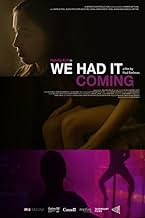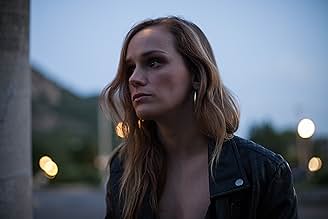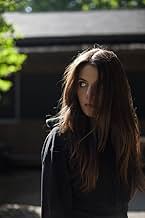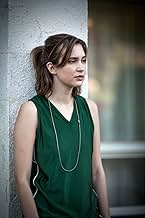Ajouter une intrigue dans votre langueAnna looks to avenge her sister's suicide to the hands of a dangerous Pimp. In the process, she encounters a mysterious female recruiter of younger more vulnerable girls.Anna looks to avenge her sister's suicide to the hands of a dangerous Pimp. In the process, she encounters a mysterious female recruiter of younger more vulnerable girls.Anna looks to avenge her sister's suicide to the hands of a dangerous Pimp. In the process, she encounters a mysterious female recruiter of younger more vulnerable girls.
- Récompenses
- 1 victoire et 1 nomination au total
Kara Raposo
- Young Anna's Sister
- (as Young Katja)
Histoire
Le saviez-vous
- AnecdotesOne of first lines of the movie by a ten year old girl is: "Go F... yourself", this also happens the last line of the movie said by Anna, portrayed by Natalie Krill.
Commentaire à la une
Despite often being disappointed I still want to support ''small'' Canadian films, especially if they don't seem to be going for cheap, thought-to-be-funny gimmicks but to instead focus on real human experiences and the drama that can be found in everyday existence. Unfortunately, despite some strengths, ''We Had It Coming'' was another disappointment.
The positives: the cinematography is very well done and makes good use of settings in and around Montreal, treating the locations in a matter-of-fact way that avoided the self-conscious signalling of ''this is home!'' that plague too many Canadian productions; and the acting by Natalie Krill as the lead is strong and believable, with only one or two weak moments that are more likely due to the material she had to work with than her performance; Erin Agostino is also good in several scenes where she's by herself and has to convey her character's thoughts and emotions silently.
The negatives: the dialogue is badly written and might have worked better on stage or in prose fiction but fails here to be believable as real human interaction (or, in short, nobody really says these kinds of things, and conversations don't play out in these ways); this was especially the case with the lines spoken by the lead character's girlfriend (Alexia Fast). This problem with the dialogue and the way writer/director Paul Barbeau conceives of human interaction also affects the story itself, which is overly simplistic and lacking in the kind of structured development that sustains even a short feature-length film. One of the two biggest weaknesses on this front is the absence of any real inner conflict on the part of the lead character, which makes the ending anti-climactic (and not just because it's an ''open'' ending; there are good open endings that are suggestive and intriguing in their ambiguity, and then there are cop-outs; the ending here fell into the latter camp, since little was really established as being at stake). If the scene in the church (which isn't integrated into the rest of the plot) was intended to show such an inner conflict, it fails to do so. The other biggest weakness in the story is how simplistic and unnuanced its ''moral'' dimension is. The story is meant to show someone standing up to the victimization of women and to express the experience of this victimization, both in its overt and its subtler forms, from a female point of view. However, the way this victimization is understood and the way that empowerment is conceived is extremely unsophisticated and naive. Without exaggeration, every male character in the film is a misogynist and an abuser of women, and the experience of being female is reduced to one of constantly feeling oppressed or victimized, with even something like a truck driver's impatience and rudeness being presented as a kind of ''gendered violence''. And I can't help thinking that the openness and flatness of the ending was partly the result of a failure to imagine what a meaningful ''empowerment'' might be. In all of this, the film seemed more a product of the kind of victim mentality that thinks it's ''woke'' for seeing oppression everywhere but has no real insight or solutions and, more importantly, no maturity or ability to deal with genuine nuance and ambiguity.
This is not to say that films setting out to cast light on or critique problems like sexism can't be done well. Catherine Breillat's ''A Ma Soeur'' (''Fat Girl'') is an example of a much better film that is also open-ended, with every male character as a misogynist to some degree, but which has genuine insight into human psychology and interaction and knows how to develop conflicts that play out at the level of emotions and subtext vs. surface actions. Another film that comes to mind as succeeding at something ''We Had It Coming'' tries but fails to do, which is to tell a story about the drive for revenge and the moral complications about its justification, is Todd Field's ''In the Bedroom''. Ultimately, the weakness of ''We Had It Coming'' and its failure to live up to the potential of its technicians (cinematographer, art director, sound designer, composer, etc.) and its lead actor lies in what Barbeau lacks that Breillat and Field had, which is insight into human psychology, experience, and interaction.
(I couldn't help but think of another, much different film in connection with this: Tommy Wiseau's ''The Room''; several times when I was watching I felt like asking Barbeau ''Do you understand life?! Do you?!'')
The positives: the cinematography is very well done and makes good use of settings in and around Montreal, treating the locations in a matter-of-fact way that avoided the self-conscious signalling of ''this is home!'' that plague too many Canadian productions; and the acting by Natalie Krill as the lead is strong and believable, with only one or two weak moments that are more likely due to the material she had to work with than her performance; Erin Agostino is also good in several scenes where she's by herself and has to convey her character's thoughts and emotions silently.
The negatives: the dialogue is badly written and might have worked better on stage or in prose fiction but fails here to be believable as real human interaction (or, in short, nobody really says these kinds of things, and conversations don't play out in these ways); this was especially the case with the lines spoken by the lead character's girlfriend (Alexia Fast). This problem with the dialogue and the way writer/director Paul Barbeau conceives of human interaction also affects the story itself, which is overly simplistic and lacking in the kind of structured development that sustains even a short feature-length film. One of the two biggest weaknesses on this front is the absence of any real inner conflict on the part of the lead character, which makes the ending anti-climactic (and not just because it's an ''open'' ending; there are good open endings that are suggestive and intriguing in their ambiguity, and then there are cop-outs; the ending here fell into the latter camp, since little was really established as being at stake). If the scene in the church (which isn't integrated into the rest of the plot) was intended to show such an inner conflict, it fails to do so. The other biggest weakness in the story is how simplistic and unnuanced its ''moral'' dimension is. The story is meant to show someone standing up to the victimization of women and to express the experience of this victimization, both in its overt and its subtler forms, from a female point of view. However, the way this victimization is understood and the way that empowerment is conceived is extremely unsophisticated and naive. Without exaggeration, every male character in the film is a misogynist and an abuser of women, and the experience of being female is reduced to one of constantly feeling oppressed or victimized, with even something like a truck driver's impatience and rudeness being presented as a kind of ''gendered violence''. And I can't help thinking that the openness and flatness of the ending was partly the result of a failure to imagine what a meaningful ''empowerment'' might be. In all of this, the film seemed more a product of the kind of victim mentality that thinks it's ''woke'' for seeing oppression everywhere but has no real insight or solutions and, more importantly, no maturity or ability to deal with genuine nuance and ambiguity.
This is not to say that films setting out to cast light on or critique problems like sexism can't be done well. Catherine Breillat's ''A Ma Soeur'' (''Fat Girl'') is an example of a much better film that is also open-ended, with every male character as a misogynist to some degree, but which has genuine insight into human psychology and interaction and knows how to develop conflicts that play out at the level of emotions and subtext vs. surface actions. Another film that comes to mind as succeeding at something ''We Had It Coming'' tries but fails to do, which is to tell a story about the drive for revenge and the moral complications about its justification, is Todd Field's ''In the Bedroom''. Ultimately, the weakness of ''We Had It Coming'' and its failure to live up to the potential of its technicians (cinematographer, art director, sound designer, composer, etc.) and its lead actor lies in what Barbeau lacks that Breillat and Field had, which is insight into human psychology, experience, and interaction.
(I couldn't help but think of another, much different film in connection with this: Tommy Wiseau's ''The Room''; several times when I was watching I felt like asking Barbeau ''Do you understand life?! Do you?!'')
- Burton_Herschel_1
- 9 oct. 2020
- Permalien
Meilleurs choix
Connectez-vous pour évaluer et suivre la liste de favoris afin de recevoir des recommandations personnalisées
- How long is We Had It Coming?Alimenté par Alexa
Détails
- Durée1 heure 25 minutes
- Couleur
- Rapport de forme
- 2.35 : 1
Contribuer à cette page
Suggérer une modification ou ajouter du contenu manquant

Lacune principale
By what name was We Had It Coming (2019) officially released in India in English?
Répondre































